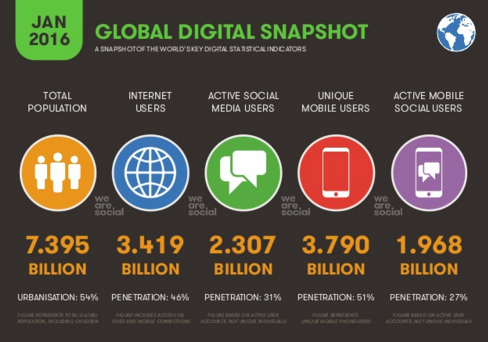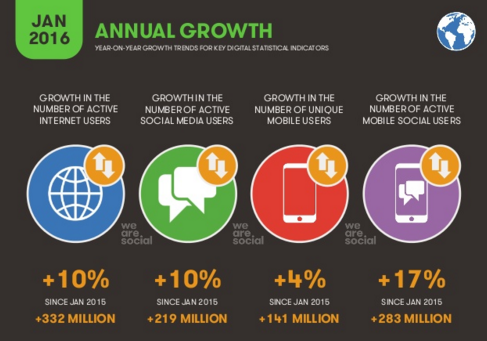By Abir El-Hallak
Maximising the potential of social media for startups.
An interesting notion? An optional marketing opportunity? Or is social media integral to the success of startups?
Let’s start at the beginning. Over a century ago a novel technology was proclaimed as the new channel that would change the business world forever. Entrepreneurs were desperate to become a part of this ground-breaking communication tool that would facilitate speedy marketing, customer service and sales performance. The telephone. This one time revolutionary tool paved the corporate communication road which has of course evolved over the years. Today, businesses, both large and small, are faced with travelling down the social media and Internet road or the ‘new telephone’ as it is sometimes referred to.
But where does this digital road lead to and in how many directions? Should your startup take this route and more importantly, which course should it choose?
The vast number of available forms of social media can be overwhelming: social networks, blogs, forums, business networks, photo-sharing platforms, social gaming, microblogs and chat apps. The numbers are equally mind-boggling. We Are Social provide a useful snapshot of key statistics for digital, social and mobile media in 2016, as summarised below:

According to We Are Social, both the number of reported internet and social media users are up by 10% since their 2015 global report.

Here are some more statistics:
- 38.6% of global online population use Facebook
- There are 305 million monthly active Twitter users
- 91% of retail brands use 2 or more social media channels
- Internet users have an average of 5.54 social media accounts
- Social networks earned an estimated $8.3 billion from advertising in 2015
- 38% of organisations planned to spend more than 20% of their total advertising budgets on social media channels in 2015
- 77% of Twitter users feel more positive about a brand when their Tweet has been replied to
- The top 3 marketing tactics are blogging (65%); social media (64%); and case studies (64%)
- There are 40 million active small business Pages on Facebook but only 2 million of those businesses pay for advertising
- 9% of US small businesses use YouTube
- Facebook accounts for 62% of social logins made by consumers to sign into the apps and websites of publishers and brands
- 65.8% of US companies with 100+ employees use Twitter for marketing
Source: Brandwatch
It is clear that social media is poised for continued long-term growth and that this global movement towards a digital age has significant outcomes for marketing and communication strategies. But why is this noteworthy for your startup?
If we look at some of the characteristics of a startup, a fundamental feature is its ability to grow unrestricted by geography. It is a company designed for scalability and growth potential. According to Paul Graham, computer scientist, venture capitalist and co-founder of Viaweb, “a startup is a company designed to grow fast” … “the only essential thing is growth. Everything else we associate with startups follows from growth.” Aswath Damodaran, Professor of Finance at the Stern School of Business states that a startup’s value “rests entirely on its future growth potential.” Similarly, Silicon Valley legend Steve Blank defines startups as an “organisation formed to search for a repeatable and scalable business model.”
As communication continues to go digital, your startup can capitalise on the evident success of social media networks in order to push forward with its own growth and it therefore follows that social media marketing can be an inexpensive and effective marketing tool that can help with its exponential growth.
Another key feature of startups is two crucial but limited resources that are critical to its endurance and continued existence: time and money. The goal is for your startup to speedily reach the self-sustaining point before running out of startup capital. This means that the business is no longer dependant on outside sources of capital, such as the founder’s savings, friends and family, bank loans, credit card debt, angel investments and eventually IPOs (initial public offering), and is generating its cash flow internally. Since a startup’s survival depends greatly on making certain that customers are aware of the existence of the product or service which requires considerable amounts of marketing and advertising, it is vital to be able to reach a large audience with a limited budget and time constraints. Enter social media. Social media makes it possible for a startup business to reach millions of consumers immediately without having to spend a large budget on a launch campaign. Of course, it’s not just potential customers who will see your social media pages. A good social media presence will also include potential investors and employees in its audience, an essential aspect to your startup success.
A further central attribute of a successful startup is awareness of the importance of brand identity. Brand identity is the personality of the business and marketing it correctly is imperative. Using social media channels helps with this marketing outreach goal and places you in prime position to control brand content generating the processes necessary to create a consistent, recognisable identity for your product or service. Web 2.0 technologies enable your startup to connect with consumers by creating a platform where information can be shared. The ideals and values embedded in your brand’s identity can therefore be effectively communicated to consumers which in turn forms a strong connection resulting in the establishment of an authentic and long-lasting identity loyalty.
Furthermore, your startup can strengthen its brand by utilising the social media opportunities to create channels for consumers to co-develop the brand identity. Building a community of identity loyalists will contribute to the brand’s success and greatly strengthen the relationship between the brand and its customers. “Brand community members buy more, remain loyal, and reduce marketing costs through grassroots evangelism” (Harvard Business Review). Consciously deploying social media will directly result in strengthening your brand and give rise to a profitable startup.
We have seen how your startup can benefit greatly from social media and can conclude that it is not just an optional marketing tool. Your startup can potentially create a platform where the brand is visible as well as connect with its audience through a marketing channel that is relatively cost effective. The key, however, is to ensure that your employment of social media is effective, successfully adds value, and distinguishes your brand from the colossal pool of brands out there. How can you do this? By creating a social media strategy personalised to your startup and Part 2 of this blog post will examine exactly how.
By Ino Ioannidi,
Abir I really liked your blog post on social media use for startups! Building a marketing and communication strategy is very important not only for startups, but for any type of business for that matter. Whether it is a service or a product that you are selling, if you don’t have a clear view of who your target audience is, what their needs are and how your product or service is going meet those, it can backfire. With the creation of the internet, and invention of the world wide web, computer communication network users have reached 3,17 billion as stated in our first blog. According to Pew Research Center report published online (2015), almost everybody is online! Only a 15% of the adult population is offline. What’s more, the percentage of elders that use social networking sites, though still small, has increased the past few years to a remarkable 35%. This means that online media (social networks, websites, blogs, etc) should be part of the marketing and communication strategy and together with any other media used it should promote a unified, coherent and consistent message of the brand. And indeed, a startup can benefit a lot from the fact that social media provide a low cost and quite efficient means to get your message across your target audience. Having your own website, facebook, linkedin, twitter account, to name a few, can get you quite the visibility and engagement your startup needs. This is not to say that it is all fun and games, it is a process that requires a lot of research, industry analysis and good profiling but start uppers are usually quite familiar with social media platforms anyway and can handle any demands or if they are not, they really need to look into hiring professional services. It might be of some cost, but will definitely pay off in the long run.
LikeLike